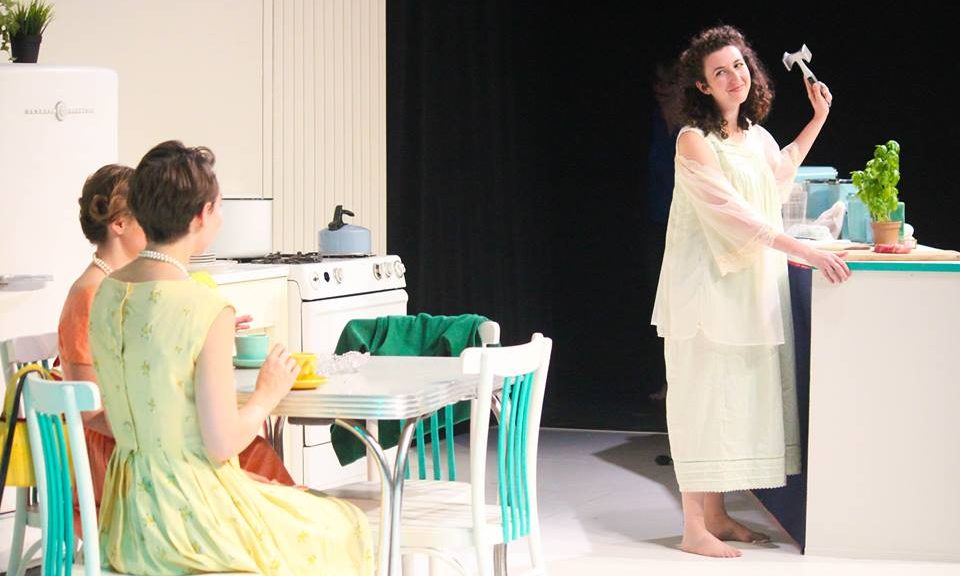In most Greek tragedies, we don’t actually get to see the violence as it unfolds. Usually, a messenger arrives with tidings from the Great Offstage, and the audience listens intently, fully transfixed by the grisly details of his account. Usually, it’s the messenger’s climax, the messenger’s story to tell.
But in this reimagining of Euripides’s Medea, a senior project in Theater Studies for Anya Markowitz ’17, when the inevitable messenger of doom (Laurence Bashford ’18) comes to deliver some—spoiler alert—bad news, it’s not him we’re focused on. It’s Medea (played by Markowitz), who, in what is undoubtedly the show’s most unnerving and gratifying sequence, delights in the tidings of a deadly plot fulfilled as she indulges in the fruits of her erstwhile domesticity: a rotisserie chicken and a chocolate cake, which she devours unapologetically with her bare hands, an id unleashed with a vengeance. Forget whatever happened offstage; this is the real moment of violence: a woman ripping off the shackles that once bound her.
Indeed, the personal is very much the political in this production of Medea, set in the deceptively placid landscape of post-WWII American suburbia. The story itself is faithful to the original: when Medea is betrayed by her husband Jason (who she, by the way, had to kill her brother and leave her native country in order to marry) her jealousy and grief drive her to commit the ultimate sin against nature, and she decides to kill her children in order to exact revenge on her husband. This production, however, contextualizes Medea as a woman of a certain generation—the housewife who, as Simone de Beauvoir writes in The Second Sex, “has no other task save the one of maintaining and caring for life in its pure and identical generality,” who is “given no direct grasp on the future, nor on the universe.” Medea has alienated herself in her marriage to Jason, and when that collapses, so too does her sense of self in the world.
Although the historical context does a lot of the heavy lifting here, the production ultimately rises above the temptation—seen all-too-often in theater on campus—to congratulate itself with a concept for concept’s sake. Instead, the specific sociopolitical backdrop serves to bring the timeless questions of this classic drama clearly and incisively into focus: what are the ethical obligations for an individual living within an oppressive system? Who gets to write the account of our actions, and on what terms? How can we, as human beings, overcome our own imminence and gain control of our destinies? And will men ever not suck?
Although the cast is rounded out with memorable performances (especially by Eleanor Slota ’17 and Rora Brodkin ‘17, Medea’s neighbors who double as comedic duo and Greek chorus), Markowitz, in the title role, is the precarious high heel on which the production turns. In an impressively intricate performance, she brings us along with her into the murky waters of the psychologically ambiguous, managing to be at once repulsive and sympathetic, incomprehensible and lucid, utterly demonic and, yet, eerily familiar.
Why does Medea choose to do the unthinkable? As an audience, we yearn for a clear, digestible answer. But the play refuses to give us one that satisfies: “Medea isn’t mad,” her friend insists at the end. Isn’t she, though? What are the lengths to which our empathy is willing to go? Is she mad or is she justified? Or, are these terms simply the victor’s, or the poet’s, to define?
In a modern age defined by its moral ambiguity, these problems resonate far beyond the walls of the theater. But whether or not these are the kinds of questions that keep you up at night, this stunning production is one that will engage, challenge, disturb, and move you. And did I mention the thing about the chicken?

